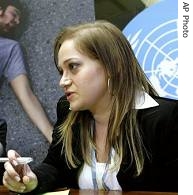2007年VOA标准英语-World Youth Assembly Tackles Road Safety(在线收听)
Geneva
23 April 2007
Young people attending the First U.N. Global Road Safety Week say road accidents can be greatly reduced if young people are involved and given a voice in decision-making. Lisa Schlein reports for VOA that about 400 young people from 100 countries are attending the first ever World Youth Assembly in Geneva to explore road safety measures.
A report by the World Health Organization says road traffic crashes are the leading cause of death for 10 to 24 year-olds. Nearly 400,000 of the 1.2 million deaths from car crashes every year involve young people under the age of 25.
 |
| Nelly Ghusayni, Chairperson for Youth Assembly for Road Safety, speaks about first UN Global Road Safety Week, at European headquarters of UN in Geneva, 23 Apr 2007 |
"This document is the main outcome of this Assembly for all of us. It has taken us more than six months to prepare this document and it is the first of its kind," she said. "It is the first time that young people write down what they think the main problems on the roads are and how they think they should be handled. So, this declaration addresses main road safety issues and we address our parents, our schools and universities, policy makers, governments, celebrities. Everyone we feel has a role in promoting road safety."
The Declaration suggests practical measures to improve road safety. The delegates pledge to wear seatbelts and motorcycle helmets and to avoid speeding and drink driving.
The report finds the vast majority of deaths and injuries occur in low and middle-income countries. The highest rates are found in Africa and the Middle East. It says young people from poor families are at greatest risk in every country. And, young males are at higher risk for road traffic fatalities than females in every age group under 25 years.
Ghusayni says the solution to safer driving does not necessary lie in taming the wild spirits of young people.
"We all like speeding and we really are at the point in our lives where we want to rebel against everything-all the rules or all the guidelines," she continued. "We will do everything we can, which is only normal. We test our boundaries and we test our limits. But, to get them really interested in this because this is something that is really un-cool for everyone. It is like the most horrible thing to be the responsible person while not drinking while driving is getting them involved. And this is why so many of the young people in the hall up there are really excited because it is the first time that they feel that they are involved."
When young people have a voice, Ghusayni says they feel they are in control and can do something that can make a difference.
The World Health Organization says measures such as lowering speed limits, cracking down on drink driving and using seat belts can significantly reduce the number of road deaths and injuries.